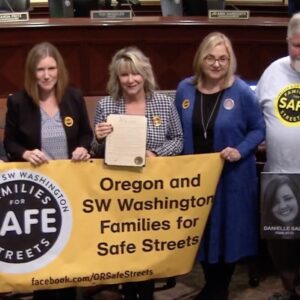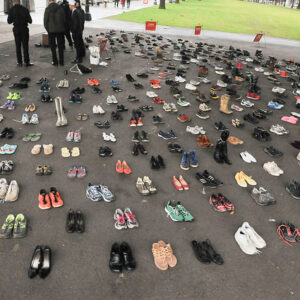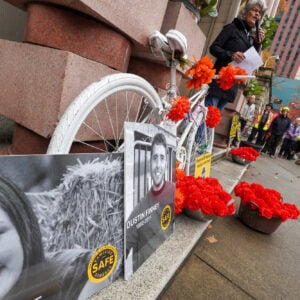
Advocates behind the annual World Day of Remembrance for Road Traffic Victims want to make the impact of this year’s event last more than one day. They’ve coupled the usual demonstration and demands for action with a traffic safety pledge they want politicians to sign.
The World Day of Remembrance is backed by the World Health Organization and has been held in many cities around the world since it started in 1995. Portland’s edition has happened since 2015 and is led by the local chapter of Families for Safe Streets, a national nonprofit for survivors of traffic violence.
On Sunday, November 19th, Families for Safe Streets of Oregon & Washington will join with The Street Trust, Oregon Walks, and other nonprofit organizations for a walk that will begin at 11:30 am at Lloyd Center. Then at noon there will be a demonstration and rally at the plaza in front of Veterans Memorial Coliseum.
“This year, we are recognizing the epidemic of traffic violence affecting our communities statewide with a memorial walk which leads to an installation representing the lives lost in our community,” reads a statement about the event from The Street Trust.
Despite years of advocacy and attention on traffic violence, the number of people who are killed and injured using roads in the Portland region continues to climb. So far this year there have been 60 traffic-related fatalities in Portland — a troubling toll also reflected statewide that marks a major trend upward in the past decade.
To help garner more support for changes and reforms that would reverse this trend, advocacy groups have released a “Traffic Safety Pledge for Oregon’s Leaders & Decision Makers.” The pledge spells out the crisis and details the consequences of dangerous streets in detail. It then asks officials to make the following seven commitments:
- Reverse racial inequalities and barriers to safe streets, focusing on marginalized communities that have been disporportionately affected by transportation decisions.
- Understand and educate the public about the significance of road fatalities, treating each loss of life with the same concern and outrage as any other type of death in our community.
- Use precise language that attributes agency and employs the active voice when discussing fatal crashes, emphasizing accountability.
- Prioritize the safety of all road users over vehicular speed and throughput, reflected in budget allocations, policy decisions, budgets, and spending.
- Champion measures such as lowering speed limits, enhancing street design and infrastructure (e.g., crosswalks), and limiting parking near intersections, especially in areas with vulnerable users like school zones.
- Reduce vehicle size – I recognize the correlation between larger vehicle size and road safety issues, and will promote safer, cleaner, and more sustainable transportation options while discouraging heavier, deadlier vehicles.
- Advocate for equitable traffic laws and enforcement, supporting comprehensive Automated Traffic Enforcement (ATE) initiatives with progressively assessed fines, and dedicating revenues to enhance safety and accessibility in our transportation system.
The list of signers and any comments they wish to share will be presented to the public at the event on Sunday the 19th.
Organizers want attendees to wear yellow. Learn more and register for the event here.








Thanks for reading.
BikePortland has served this community with independent community journalism since 2005. We rely on subscriptions from readers like you to survive. Your financial support is vital in keeping this valuable resource alive and well.
Please subscribe today to strengthen and expand our work.
The pledge does not mention DUI, even though it is responsible for about 33% of traffic-related fatalities in Oregon. Distracted driving is also not mentioned and is officially responsible for around 8% of traffic-related fatalities, although the actual percentage is believed to be higher. Distracted driving is also believed to be a contributing factor in between 38% and 52% of collisions.
Currently, the most effective means of reducing DUI and distracted driving is through manual enforcement. Manual enforcement of DUI also reduces the chance of fatalities by preventing the DUI driver from continuing on, and instead towing the vehicle. If the DUI driver triggers an ATE, that will not save the collision victim(s) because it will not stop the DUI driver from trying to continue on to their destination. Stopping the drive requires manual DUI enforcement. There is a lot of work to be done to refine exactly what needs to happen to the DUI driver after they are caught in order to lower the chance of repeat offenses, but none of that can be done if they are never caught in the first place.
I thought that when the traffic enforcement unit was previously discontinued, that they would still at least enforce DUI, but apparently not because ODOT had to step in and give the city a grant specifically just to continue some number of hours spent for DUI enforcement.
When budgets are tight, there may be a tendency to reduce drunk driving and distracted driving enforcement and rely on ATE, but if this becomes public perception, then the rate of DUI and distracted driving could increase. We already saw that when the public became aware that some crimes were deemed low priority, the rates of those crimes increased, and the same could hold true for DUI. Not including DUI and distracted driving in the pledge may be sending the wrong message to certain drivers who collectively cause around 40% of the total fatalities.
Sure, some especially targeted DUI enforcement could help (i.e. we know where people DUI from, check first at the parking lot full of cars at a bar). Should be easy to set up regular stings in areas like this. I don’t see how anyone could object and it’s very easy to do.
But I think the role of ATE, applied broadly over the city, is being downplayed by your comment. I think people seem to be under the impression that DUI means an (in absolute terms) very high chance of collision and injury. The reality is the vast majority of drunk drivers make it home without incident and do this *repeatedly and regularly*. That means the fact that ATE won’t stop them from continuing their current journey is besides the point. If they are driving in a way that would trigger ATE, they will get repeated tickets and that would be expected to change behavior.
Like I said, yes, do stings especially at places where realistically, most people driving away are doing so drunk. But lets not pretend ATE doesn’t actually help this situation. We should be going full speed ahead on installing as much of it as we can (obviously starting with the most problematic driving areas).
On the topic of distracted driving, how do you think that could even be enforced in a way that won’t obviously be abused? Everyone has a phone, if a cop wanted to they could pull over anybody and say they were driving distracted. This is a real problem. I just don’t know what the actual, real life, enforcement mechanism is for this. Regulating the cars themselves, yes. Touch screens should be illegal, only simple knobs and buttons. Hands free phone conversations should not be allowed as an exception to cell phone use (but that gets to the problem of enforcement again). Maybe even the vehicle shouldn’t be allowed to block out sound as well as they do. Just spitballing.
You need to balance the risk of abuse versus the danger of distracted drivers. Using very rough numbers, based on what has been posted here, it seems about 10,000 people a year die from distracted driving. How bad does the potential for abuse have to be to outweigh that?
But let me guess. The local transportation activists (Bike Portland, Oregon Walks, Bike Loud) will make NO mention of the need for more police traffic officers. Right? Traffic stops in Portland have plummeted and as they have traffic violence has increased dramatically. Let’s stop pretending enforcement of our laws doesn’t foment traffic violence.
(Jonathan guessing you will block this comment because you often censor posts supporting police enforcement of our laws)
Hi Clarissa,
Nobody is censoring your multiple personas. In fact, an articulate center/center-right voice would be welcome. Here’s “Clarissa G.” back in May with a different email address and IP. (Did you get married or something?)
And “Jeremy,” with the same IP address as “Clarissa G,” sounds just like the two Clarissas:
What raises my suspicion is that you won’t use a single identity and post at length. It’s always three to four sentence long on-message talking points with a changed-up identification.
Hey, I’m a big fan of John LeCarre. I know a string of sleeper cells when I see one.
I can confirm this!
~50% of the people commentating here are my alter egos.
Busy boy!
Damn, I had even odds your account was three autonomous socialist collectives in a trench coat! 😉
LOL. Sleeper cells? Anything to reject law and order in Portland, huh? And ya’ll wonder why your population is declining?
jajajaja. If you want to see some real traffic violence come visit me south of the border (Puerta Vallarta). And you’ll be grateful about the honesty and hard work of your Portland police officers. Corruption is commonplace here and traffic can be loco.
Only the muy valiente ride bikes here.
I never said anything about police officers.
I’m sure most people here would love it if the police would do their jobs Clarissa P/Clarissa G/Jeremy. I know this because most people advocate for that exact thing. You seem to be the one doing all the pretending.
Have we already forgotten the part where the Police stopped making traffic stops as a strategy to get more money?
Do we want them making traffic stops or responding to calls of shots fired? As the most understaffed police department in the country, they have to make tough choices.
Violent death by gun, in your opinion, is more worthy of a response than violent death by vehicle? Very interesting. It’s as if you think preventable violent loss of life is acceptible if done with a vehicle
First, they could have endorsed automated enforcement rather than delaying or blocking it. Second, this is a false choice, because they could do both, but prioritize “shots fired” in the event they happen at the same time. Third, they could have forgone the very public announcement that they were not going to enforce traffic violations until they got more money.
There are a significant number of BP commenters who are proponents of the ACAB doctrine unfortunately. It’s a shame honestly because that view is a significant barrier to reducing traffic violence. As a proud father of a law enforcement daughter I can tell you she’s part of the solution rather than the root of all society’s problems. Unfortunately I don’t think there’s a single ACAB proponent on BP who would ever take the time to sit down over coffee and LISTEN to her about reducing traffic violence which is sad on so many levels.
What is a significant number? You don’t see the characters ‘ACAB’ very often here. Comments are moderated and people don’t get to call other people or groups bad names. BP staff have had a working relationship with some police officers and may even have a few direct lines on their phones.
For me,
-Being a police officer is a hard job and I don’t want it.
-Many smart, hardworking, caring people become police officers.
-The state of the art in police training is to respond with overwhelming force and sometimes use firearms early in an encounter.
-While police work is absolutely dangerous, it’s not the only personally dangerous occupation. I’ve worked in a trade where people were known to die on the job. In particular, police training puts a huge emphasis on the danger of traffic stops. I do understand that there is some danger for an officer performing a traffic stop.
I live with danger too, such as every time I roll through an intersection on a bike with the legal right of way. My safety depends on other people consistently doing the right thing. Since people do not always do the right thing I carry some suspicion into all my encounters with people driving cars. That’s paranoia, more or less.
When the Stumptown Fellas sang at the 2016 World Day of Remembrance, pictured here in Jonathan’s lead photo, one of the songs they sang was this one. These guys singing were the age some of the sons of moms present from Families for Safe Streets would have been had they not been killed, or the age they were, at the time they were killed, by traffic violence. Heartbreaking. “Do you remember?” https://www.youtube.com/watch?v=s8vFxntfYrE&t=0s&ab_channel=BetsyReese